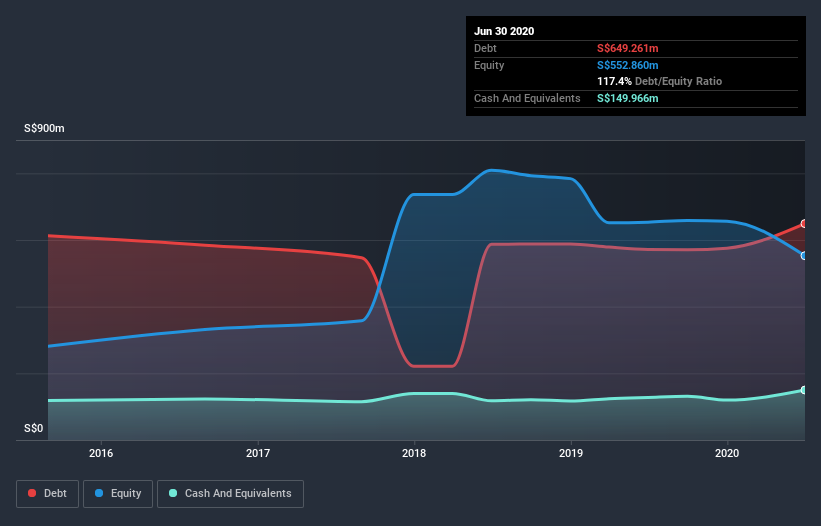David Iben put it well when he said, 'Volatility is not a risk we care about. What we care about is avoiding the permanent loss of capital.' When we think about how risky a company is, we always like to look at its use of debt, since debt overload can lead to ruin. As with many other companies Thomson Medical Group Limited (SGX:A50) makes use of debt. But the real question is whether this debt is making the company risky.
What Risk Does Debt Bring?
Generally speaking, debt only becomes a real problem when a company can't easily pay it off, either by raising capital or with its own cash flow. If things get really bad, the lenders can take control of the business. However, a more frequent (but still costly) occurrence is where a company must issue shares at bargain-basement prices, permanently diluting shareholders, just to shore up its balance sheet. Of course, debt can be an important tool in businesses, particularly capital heavy businesses. When we examine debt levels, we first consider both cash and debt levels, together.
See our latest analysis for Thomson Medical Group
What Is Thomson Medical Group's Net Debt?
As you can see below, at the end of June 2020, Thomson Medical Group had S$649.3m of debt, up from S$571.6m a year ago. Click the image for more detail. However, because it has a cash reserve of S$150.0m, its net debt is less, at about S$499.3m.

How Healthy Is Thomson Medical Group's Balance Sheet?
Zooming in on the latest balance sheet data, we can see that Thomson Medical Group had liabilities of S$73.5m due within 12 months and liabilities of S$668.0m due beyond that. Offsetting this, it had S$150.0m in cash and S$19.7m in receivables that were due within 12 months. So its liabilities total S$571.8m more than the combination of its cash and short-term receivables.
Thomson Medical Group has a market capitalization of S$1.37b, so it could very likely raise cash to ameliorate its balance sheet, if the need arose. But we definitely want to keep our eyes open to indications that its debt is bringing too much risk. The balance sheet is clearly the area to focus on when you are analysing debt. But you can't view debt in total isolation; since Thomson Medical Group will need earnings to service that debt. So when considering debt, it's definitely worth looking at the earnings trend. Click here for an interactive snapshot.
Over 12 months, Thomson Medical Group saw its revenue hold pretty steady, and it did not report positive earnings before interest and tax. While that hardly impresses, its not too bad either.
Caveat Emptor
Over the last twelve months Thomson Medical Group produced an earnings before interest and tax (EBIT) loss. Indeed, it lost S$33m at the EBIT level. When we look at that and recall the liabilities on its balance sheet, relative to cash, it seems unwise to us for the company to have any debt. So we think its balance sheet is a little strained, though not beyond repair. We would feel better if it turned its trailing twelve month loss of S$65m into a profit. So we do think this stock is quite risky. The balance sheet is clearly the area to focus on when you are analysing debt. However, not all investment risk resides within the balance sheet - far from it. Take risks, for example - Thomson Medical Group has 2 warning signs we think you should be aware of.
Of course, if you're the type of investor who prefers buying stocks without the burden of debt, then don't hesitate to discover our exclusive list of net cash growth stocks, today.
If you’re looking to trade Thomson Medical Group, open an account with the lowest-cost* platform trusted by professionals, Interactive Brokers. Their clients from over 200 countries and territories trade stocks, options, futures, forex, bonds and funds worldwide from a single integrated account. Promoted
Valuation is complex, but we're here to simplify it.
Discover if Thomson Medical Group might be undervalued or overvalued with our detailed analysis, featuring fair value estimates, potential risks, dividends, insider trades, and its financial condition.
Access Free AnalysisThis article by Simply Wall St is general in nature. It does not constitute a recommendation to buy or sell any stock, and does not take account of your objectives, or your financial situation. We aim to bring you long-term focused analysis driven by fundamental data. Note that our analysis may not factor in the latest price-sensitive company announcements or qualitative material. Simply Wall St has no position in any stocks mentioned.
*Interactive Brokers Rated Lowest Cost Broker by StockBrokers.com Annual Online Review 2020
Have feedback on this article? Concerned about the content? Get in touch with us directly. Alternatively, email editorial-team@simplywallst.com.
About SGX:A50
Thomson Medical Group
An investment holding company, provides healthcare services for women and children in Singapore, Malaysia, and Vietnam.
Moderate growth potential and slightly overvalued.
Similar Companies
Market Insights
Community Narratives



